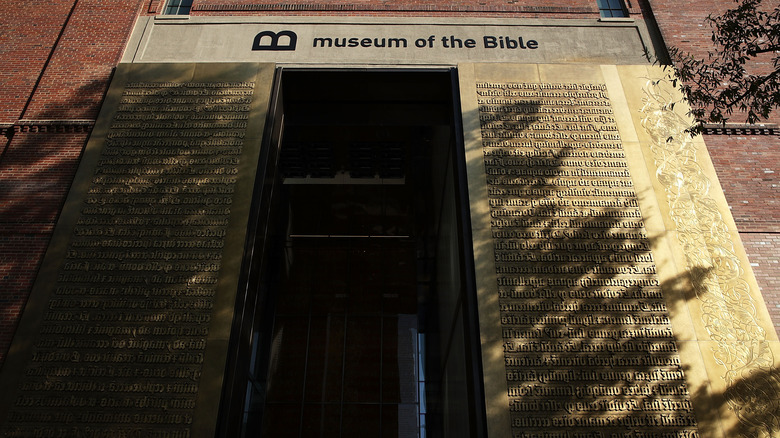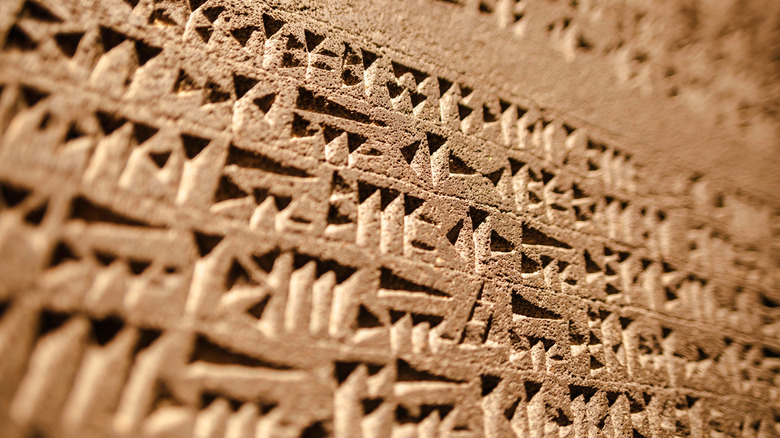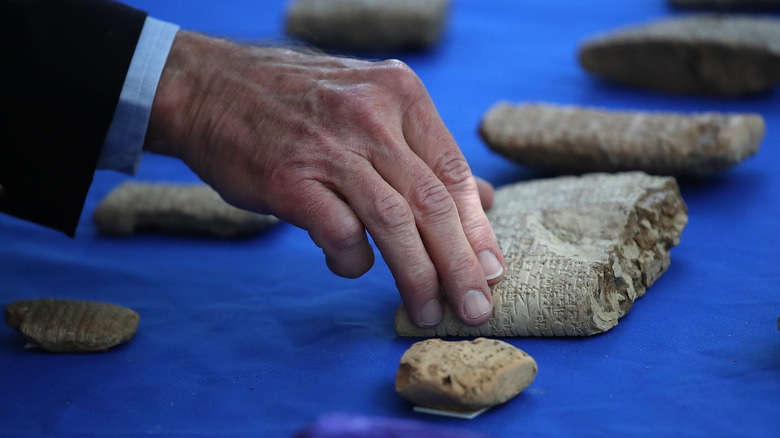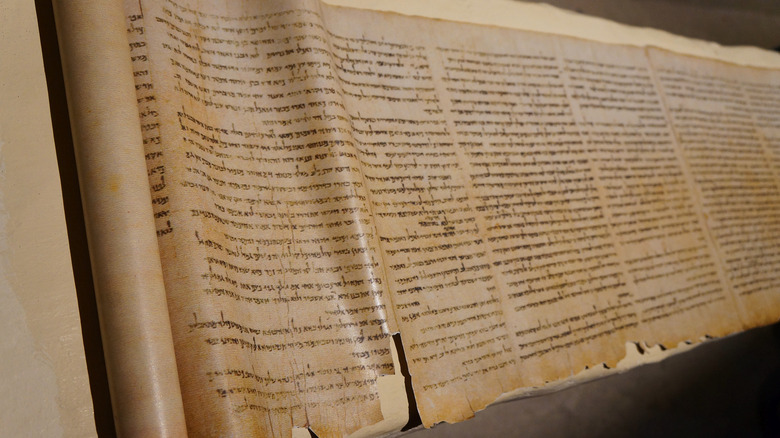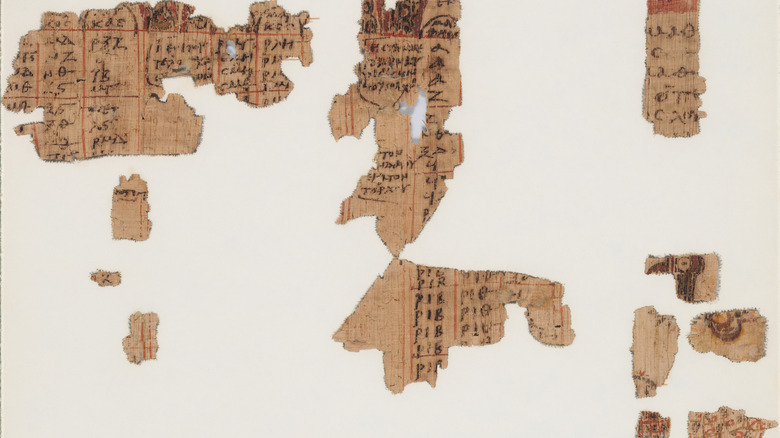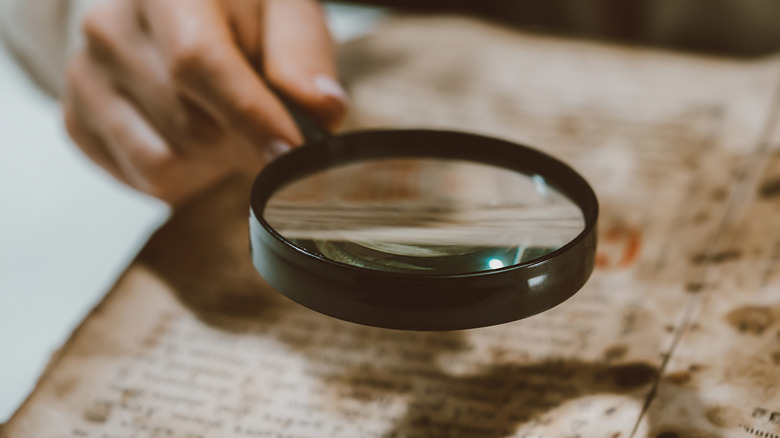The Untold Truth Of Hobby Lobby's Museum Of The Bible
The Museum of the Bible in Washington, D.C., is an interesting museum. It's been around since late 2017 and has already contributed to a lot ... of controversies. As you might expect, the museum houses all sorts of biblical texts and rare bibles collected by devout people throughout history. Their mission, as their website says, is to get people from all walks of life and each corner of the world to "engage in the transformative power of the Bible."
Now, that sounds pretty great if you're of the Christian faith, but even if you're not interested in the Bible as a spiritual or religious path to understanding the universe, the idea of the museum is pretty neat. It's a place where you can spend about $20 to look through the texts' transformations throughout history. Maybe you just like Hobby Lobby and want to visit the museum because it's supported by the Green family, the store's owners. Of course, that's if any of the texts in the place survive the vast number of controversies the museum has had in the few years they've been open — or if you still have interest in paying for a visit after learning about them.
Had a smuggled Epic of Gilgamesh
In 2014, Hobby Lobby made a major purchase for the upcoming museum's collection, and what we mean by that is a massive $1.6 million purchase of a single tablet, according to NPR. The piece in question is known as the Gilgamesh Dream Tablet. This is a stone tablet imprinted with the cuneiform writing of ancient Mesopotamia from around 1600 BCE, and as Christie's explains, this tablet is an exceedingly rare fragment of the Gilgamesh story. Only 30 fragments are known to exist. That means this piece could've brought the Museum of the Bible plenty of visitors — you know — if it hadn't been seized by the government.
According to the U.S. Department of Justice, the U.S. District Court for the Eastern District of New York ordered Hobby Lobby and the museum to forfeit this piece of literary history because it had been purchased illegally, having been smuggled out of Iraq in the modern era. The tablet had changed a few hands before reaching Hobby Lobby, but even had it not been smuggled out of Iraq, it still came into the U.S. illegally via undeclared international mail. The fact of the matter is: stolen antiquities are a serious issue. So, it's probably a good thing the museum has only had one such incident. Oh, wait.
It wasn't the only tablet seized from the Museum
The Gilgamesh Dream Tablet hasn't been the only tablet seized from Hobby Lobby's Museum of the Bible. According to PBS, the nationwide craft merchant had purchased 3,800 artifacts back in 2010, all of them illegally smuggled. As the U.S. Immigration and Customs Enforcement agency notes, there were a lot of goodies in that grab-bag too. Several cuneiform tablets were in the mix, clay cones featuring royal inscriptions, documents with incantations and bilingual translations, clay seals, you name it. The range was nearly as eclectic as the items were valuable, with some of the artifacts originating in the second century BCE and others as new as the seventh century CE.
You won't be able to find those artifacts at the Museum of the Bible or any museum in the United States for that matter. In 2018, the U.S. government returned them to their country of origin, Iraq, in the first exchange of this kind since the U.S. invaded the country. It was a big step, and if nothing else came from this possibly malevolent blunder, at least Hobby Lobby helped the two countries take one small step towards healing.
Housed "authentic" Dead Sea Scrolls
It's really difficult to tell whether any of Hobby Lobby's Museum of the Bible controversies were committed out of malice and greed, if they were simply a product of incompetency, or if there was a healthy mix of both to blame. Regardless, we've got another one for you.
Clear back in 2009, before the Museum of the Bible had officially opened, Hobby Lobby president Steve Green was working on building the museum's collection. As Smithsonian Magazine points out, this includes 16 Dead Sea Scrolls. Like other documents in the Hobby Lobby backed collection, these items are pretty darn rare, so people doubted their authenticity as soon as the museum opened its doors. Smart cynics.
Once an academic publication was released questioning the documents' authenticity, according to NPR, the museum itself grew suspicious of the scrolls and sent them to experts in Germany for all sorts of fancy tests. It wasn't long before five of them were determined to be fakes, which is a rip-off, but it could be worse. And it was.
As of 2020, a new study of the scrolls confirmed that all of them were modern forgeries most likely inscribed on ancient leather to fool the "professionals." The museum had officially been duped 16-fold.
They had stolen Bible fragments too
One of the cool things in the Hobby-Lobby-backed biblical collection were the oldest-known surviving Bible fragments — at least 11 in total. Too bad they turned out to be stolen.
Advanced Local says the story is believed to have all started with Professor Dirk Obbink, a world-renowned and celebrated classics professor who'd directed Oxford's Oxyrhynchus Papyri Project. He was also the alleged thief who looted the project. The guy was the recipient of the acclaimed MacArthur Fellowship, colloquially known as the "genius grant," for crying out loud, and he still might have ganked priceless artifacts.
This is where the thing gets kind of odd. It would be easy to think a professor was simply trying to make a buck and started selling the historic Bible pieces to whomever would buy them. But no, the only sales of stolen artifacts Obbink is thought to have made went to Hobby Lobby, and Hobby Lobby only let a few people view the priceless treasures under the lock and key of an NDA. No one is saying they were hiding something, but it sure looks like they were hiding something. The problem is these artifacts would be difficult to hide since there are very few of them floating around.
Of course, since this went down in 2020, everyone involved is denying everything, but Obbink did admit to receiving payments from Hobby Lobby's Steve Green, and Green's collection did include the stolen fragments.
The museum is lacking in credibility
The only thing a museum really has going for it is its credibility. They deal in the history of the world, displaying and studying artifacts, and if they can't be trusted, then their work shouldn't make it into the pages of our collective past. It kind of defeats the purpose, and it's that idea that makes the Museum of the Bible look a bit like the guy selling "real Gucci" out of the alley downtown and less like a reputable cataloger of the human experience.
Looking at the history of failed acquisitions, it would be difficult to trust the authenticity of any exhibit on display within the museum, sure, but there are other problems too. As Vox points out, it's hard to take the museum seriously as a place of study in terms of the truth behind these biblical artifacts. The Green family is reported to spend about half the money Hobby Lobby makes on evangelical outreach and other religious work. That would make one think the "museum" was actually a conversion scheme or something less academic, to say the least, but there's more. The early designs of the museum included ideas of handing out "accept Jesus" pamphlets to visitors, and their official purpose listed on their early non-profit forms said things like "to inspire confidence in the absolute authority and reliability of the Bible." Hard to do if you haven't exactly proven your own reliability.
